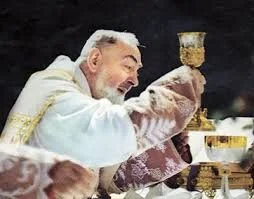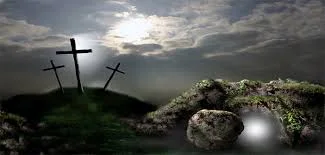The most important truth that God entrusted to Christianity was the test that took place on the road from the Crucifixion to the Resurrection in which Jesus revealed God to us. The preservation and propagation of this truth, God put into Christianity's hands. Christianity is its guardian - its champion - its publisher . Christianity's purpose is to keep this truth alive so the children of Adam and Eve can, through it, know their God. It gives us a high fidelity understanding of God.
Religious practices keep important truths about God alive. When we encounter a religious practice, it is always insightful to try to figure out what truth it is keeping alive. A religious practice not assigned to a truth about God is a fetish - a superstition.
What Christian religious practice keeps alive the test that took place on the road from the Crucifixion to the Resurrection?
Obviously, the most Holy Eucharist of the Mass keeps the test alive.
Jesus deposited his body and blood into the bread and wine of the Most Holy Eucharist . His decision to use body, blood, bread and wine was not random, accidental, arbitrary or capricious. Jesus deliberately picked the four elements of the most Holy Eucharist to serve as vehicles that convey to us the story that reveals the identity of God and its importance.
The body and blood remind us of the exorbitant price that Jesus paid to reveal God to us. The bread and wine convey the importance of the revelation.
To reveal God to us, Jesus invested his flesh and blood. He bet big. He wasn't tentative, He didn't hold back. He was all in. He deposited all of his limited human resources into the test that took place on the road from the Crucifixion to the Resurrection. 100%. He kept not a penny for himself. He emptied his pockets. He has never invested more in anything else. "Greater love hath no man than this, that a man lay down his life for his friends" .
The connection between the body and blood is his wounds. The evil that we did to him punctuated his body with bloody wounds. Our evil opened the gateway - broke the dam - to permit a river of forgiveness to pass through his bloody wounds and into the Valley of Tears. The river of forgiveness that passes through his bloody wounds reveals God to us. Forgiveness is the vehicle that Jesus used to show God to us.
Isn't forgiveness one of the sweet fruits of love? Isn't a tree known by its fruit ?
Doesn't the fruit of the tree tells us that God is love ? To know forgiveness is to know God. To know God is to have eternal life .
The bread and wine of the most Holy Eucharist testifies to the impotance of the remarkable fact that he forgave us for the evil that we did to him. Without food and drink, we die of hunger and thirst. Without the bread and wine of the most Holy Eucharist, death is just as certain.
The religious practice of the Mass preserves and propagates the revelation that Jesus gave us on the road from the Crucifixion to the Resurrection that disclosed to us the identity of God.
In the most Holy Eucharist of the Mass, Jesus himself reminds us of the exorbitant price he paid to turn on the lights
so we could see with our own two eyes the nature of God.
The Mass is the means by which the Church preserves and propagates the story that unfolded on the road from the Crucifixion to the Resurrection in which Jesus revealed God to us. In the Mass, the story is repeated. The Mass transports the story from then and there, across time and space, to us here and now. The story that unfolded on the road from the Crucifixion to the Resurrection in which evil and forgiveness danced together as the oddest of couples is the original story. The Mass is the echo of the original story. No original; no echo.














The most Holy Eucharist is the throne of the Son of God upon the earth. It is not empty. He sits upon it